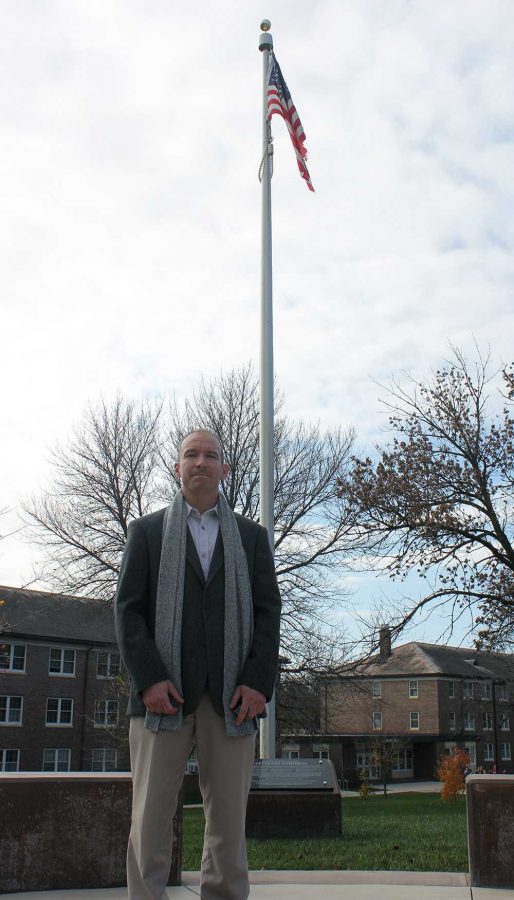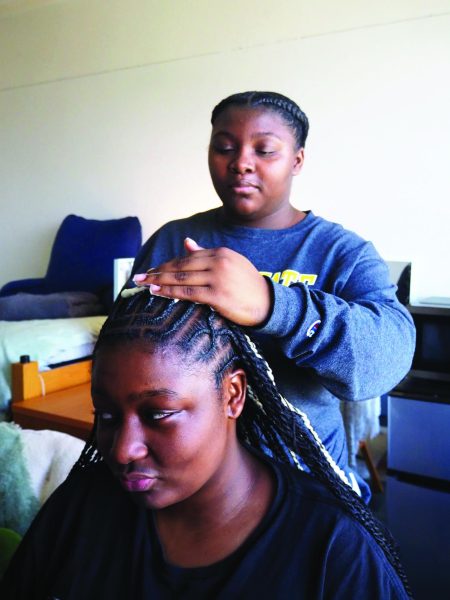Veterans that walk among us
Steve Elliott, Dean of the School of Arts and Humanities, stands at the Veteran’s Memorial dedicated on campus in 2014. Elliott served for four years in the Marine Corps.
November 11, 2015
Like some other young people, Makael Lanum once hated the idea of serving in the military. The idea of leaving her family and friends behind for long periods of time scared her.
But that changed when she started worrying how she was going to pay for college. After her dad encouraged her to join the Air National Guard, Lanum, by the summer following her freshman year at WSC, was on a bus to Lackland Air Force Base to begin her military training.
Today, Lanum is both a senior at WSC and a senior airman in the Air National Guard.
“By the end of basic training, it wasn’t about paying for school anymore,” she said. “Being able to be part of something bigger and better than yourself is truly a great feeling, I wouldn’t change it for a thing.”
Lanum’s commitment involves “drill” one weekend a month in Lincoln and training two weeks out of the year, along with possible deployments for up to a year. While she has not yet been deployed, Lanum has been overseas once, and will be going again in the upcoming year.
Lanum cited her professors as being major supporters by allowing her to get school work done ahead of time, and let her catch up when needed.
“The best part would probably have to be the travel, experiences and pride that comes along with being in the military,” Lanum said.
Her advice to students who are thinking about joining is to ask the recruiter a lot of questions, and to join it for the right reasons.
“While it is a ‘good gig,’ it’s so much more than that. It’s one of the most rewarding things I have done in my entire life,” she said.
Seven WSC students and 40 at the University of South Dakota are part of a cross-enrolled Reserve Officers’ Training Corps program at USD in Vermillion.
ROTC students take military science courses, along with any major of their choice. ROTC professors from USD teach courses at Wayne, and WSC students are frequently invited to leadership labs and special events in Vermillion.
Lieutenant colonel Michelle Bunkers is a professor of military science at USD who works with the Wayne State ROTC students. Bunkers, who came to USD in August, said that the popularity of the ROTC program is picking back up in popularity.
“I’m looking forward to working with the faculty and staff at Wayne State and developing the ROTC program further,” she said.
Bunkers listed some of the benefits of ROTC as leadership skills, financial aid, character, physical fitness and professional competence.
Financial aid is a major benefit of the program. Students who join have the opportunity to receive a two or three-year scholarship. This comes with free tuition, a stipend for books and a stipend of $3-400 for expenses such as rent.
If ROTC students maintains a GPA of 2.5, they will receive $10,000 commissioning bonus, along with no deployment until after commission.
Cody Sellhorst is one of the seven WSC students presently enrolled in ROTC.
“I joined the Nebraska National Guard my senior year of high school because I always wanted to be the person that would lead other soldiers,” senior Sellhorst said. “When the opportunity was given to me to go to college and become an officer, I couldn’t say no to that.”
When asked if it was difficult to balance ROTC and college, Sellhorst explained that it wasn’t a huge challenge. Most leadership labs fall on the weekends, and workouts are in the mornings before classes.
“Sometimes ROTC events do come up during personal events and there’s no way out of it,” Sellhorst said. “But making sacrifices for a program that is paying for your college is well worth it.”
When Sellhorst graduates from WSC, he will commission as a second lieutenant in the Nebraska National Guard, then leave for Army Basic Officer Leadership Course (BOLC). After completing BOLC, he will come back to Nebraska to find a civilian job and still be part of the Nebraska National Guard.










Ryan Pollock • Nov 11, 2015 at 3:49 pm
Very well done Miss Bottrell! These programs are a huge benefit to not only the individuals who truly earn them, but to WSC and our country as well.